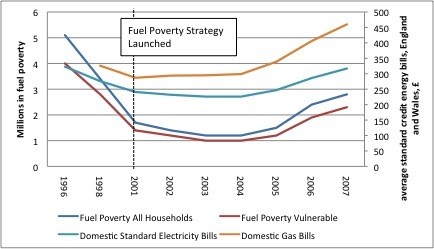The Winter Fuel Allowance was an emotive part of the election campaign, with Labour accusing the Tories of planning to scrap it and David Cameron promising not to. At no point during that debate was it asked whether the WFA was a good way to spend money.
Our report earlier this year, Cold Comfort, examined in some detail the demographics of fuel poverty, as well as questioning the logic behind the government’s target. If you take the fuel poverty measure (those spending more than 10% of income on energy) as read, the last government failed utterly to achieve anything on it – as the graph below shows. They introduced the target when fuel poverty was declining sharply and were surprised when it bottomed out and started rising again. The failure to break the very close link between energy prices and fuel poverty suggests that the roughly £20 billion spent since 2000 on fuel poverty has achieved very little.

The WFA may be welcome to those who receive it (who ever says no to ‘free money’, and right before Christmas?) but it is a poor use of scarce public money. The targeting of it, on all
older people, is justified on the grounds that half of the fuel poor are pensioners. But only 18.2 percent of over-65s are fuel poor. In fact, on 2008 figures, couples over 60 without dependent
children were slightly below the national average for being in fuel poverty – 11.2 percent compared to 11.5 percent. There are much better groups to target – the unemployed, those
living alone (including lone pensioners) and lone parents are more likely than pensioner couples to be struggling.
The most important question is how to tackle the real cause of people struggling to pay their bills. Upgrading the energy efficiency of homes is unglamorous and isn’t very visible (unlike a
cheque from the Government) but it would be far more effective than handouts to subsidise poorly-insulated homes. The Government’s Green Deal should help a lot here.
If the government wants to continue to give pensioners a Christmas bonus it should be honest about what the WFA actually is – an income supplement. If it actually wants to tackle the numbers of people struggling to pay their bills it should prioritise energy efficiency which will do a lot of the work. It might also want to reconsider some of its poor value for money climate change policies – such as the absurdly generous subsidies for micro-renewables (see our report, Greener, Cheaper) – which are paid for by all of us through our bills.
Robert McIlveen is a research fellow at Policy Exchange’s environment and energy unit.






Comments